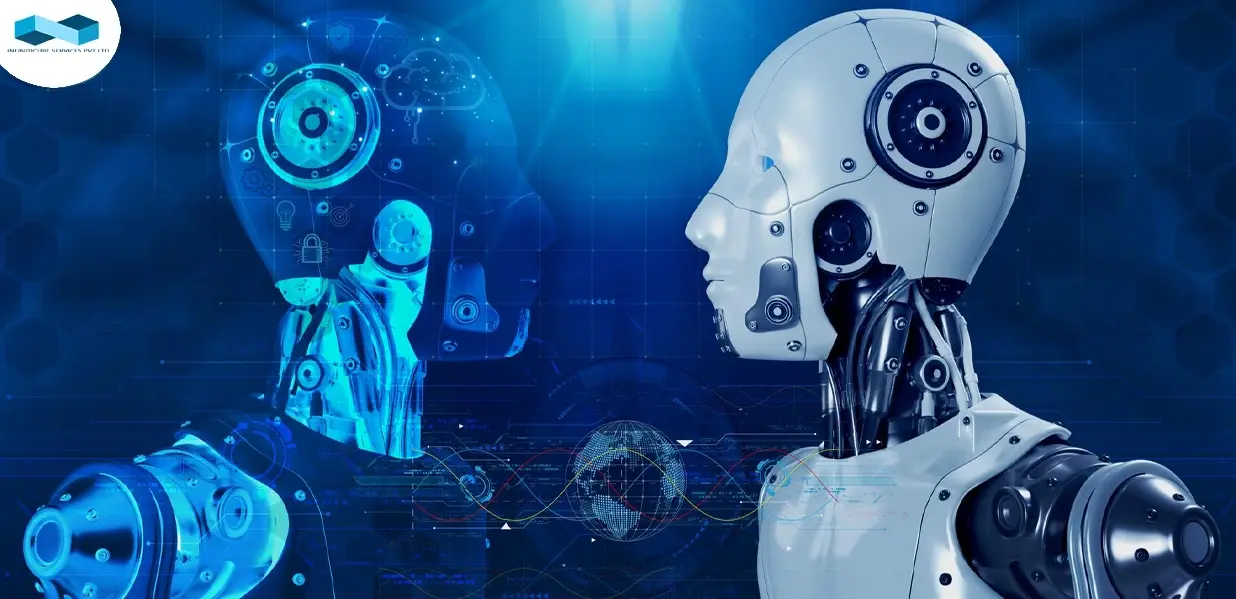AI in Education: Remarkable And Better Learning Experiences
Imagine a classroom where each student's unique learning pace and style are not just recognized but actively catered to. Envision a world of education where accessibility and inclusivity are not just ideals but tangible realities. AI in education is making all of this possible and more.
The purpose of the blog is to go deep into the world of AI in education, unraveling the intricacies of how it personalizes learning, empowers educators, automates administrative tasks, and fosters inclusivity. We'll uncover real-world case studies and success stories, showcasing how AI is offering competent services to grow business and redefining what it means to learn and teach in the 21st century.
So, if you are planning to start your own education platform then let’s embark on this journey into the future of education, where AI is not just a tool but a transformative ally, promising remarkable and better learning experiences for all.
This blog is designed in such a way that it will help you by providing clarity to your rough idea of starting your own ed-tech platform powered by AI technology.
Understanding AI in Education
Artificial Intelligence (AI) in education represents a paradigm shift in the way we approach teaching and learning. It's not just about incorporating technology into the classroom; it's about harnessing the power of machine learning, data analysis, and natural language processing to create a more personalized, efficient, and effective educational experience.
AI in education is the application of artificial intelligence and machine learning technologies to various aspects of the educational process. It involves using algorithms and data analysis to enhance both the teaching and learning experience. Unlike traditional, one-size-fits-all approaches, AI adapts and customizes education to meet the unique needs and preferences of individual learners.
Key Benefits of AI in Education
- Personalization of Learning: AI can create personalized learning pathways for students. It assesses their strengths and weaknesses, adapts content accordingly, and provides additional support where needed. This ensures that students are challenged appropriately and not overwhelmed.
- Data-Driven Insights: AI collects and analyzes vast amounts of data on student performance. This data is invaluable for educators, helping them identify struggling students, track progress, and refine their teaching strategies.
- Automation of Administrative Tasks: Educators and institutions can benefit from AI by automating time-consuming administrative tasks. This frees up more time for teaching and interacting with students.
- Accessibility and Inclusivity: AI tools can assist students with disabilities by providing real-time support, such as text-to-speech or speech-to-text functions. Additionally, AI can help bridge language gaps, making education more inclusive for diverse learners.
Examples of AI Software in Education
AI's influence on education is far-reaching and diverse. Here are some prominent examples:
- Adaptive Learning Platforms: These platforms use AI algorithms to analyze student performance and adjust the curriculum in real time. They provide personalized learning experiences that cater to individual needs and progress.
- AI-Powered Tutors: Virtual tutors and chatbots can assist students with their questions and provide explanations, making learning more interactive and accessible, even outside traditional classroom hours.
- Customized Content Recommendations: AI can recommend educational resources and content that align with a student's interests and learning style, making self-directed learning more effective.
Personalized Learning with AI
In education, one size does not fit all. Students have diverse learning styles, paces, and strengths. Enter Artificial Intelligence (AI), which has ushered in an era of personalized learning, revolutionizing the way students acquire knowledge. Let's explore how AI in education is tailoring learning experiences to individual needs and preferences.
Adaptive Learning Platforms:
One of the most prominent applications of AI in personalized learning is adaptive learning platforms. These systems employ sophisticated algorithms to continually assess a student's progress and adapt the curriculum accordingly. Here's how they work:
Assessment:
The system evaluates a student's performance, strengths, weaknesses, and learning style. This assessment goes beyond traditional testing; it considers various data points, including how a student interacts with learning materials.
Customized Content:
Based on the assessment, the platform selects or generates content that aligns with the student's needs. If a student struggles with a particular concept, the platform offers additional explanations or practice problems. Conversely, if a student excels, it presents more challenging material to keep them engaged.
Pacing:
AI adapts the pacing of the curriculum. Some students might move quickly through the material, while others may need more time to grasp concepts. Adaptive learning ensures that no one is left behind or held back.
Feedback and Progress Tracking:
AI provides real-time feedback and tracks a student's progress. Educators and students can access detailed analytics to understand strengths, weaknesses, and areas requiring improvement.
The Benefits of Personalized Learning With AI
- Improved Engagement: Students are more engaged when learning aligns with their interests and abilities.
- Better Learning Outcomes: Tailored content and pacing lead to improved retention and comprehension.
- Individualized Support: Students receive the help they need precisely when they need it.
- Data-Driven Insights: Educators gain valuable insights into student performance, allowing them to refine their teaching methods.
AI in Education: Data-Driven Insights
With the integration of AI in education, educators are gaining access to data-driven insights that were once unimaginable. Let's explore how AI in education is reshaping education through data-driven insights.
1. Predictive Analytics in Education
Predictive analytics leverages AI to analyze vast amounts of data to forecast future trends and outcomes. In education, this means identifying at-risk students who may struggle academically or drop out. Here's how it works:
Early Warning Systems: AI algorithms process student data, including attendance, coursework, and engagement patterns, to detect early signs of academic challenges. Educators receive alerts and can intervene before issues escalate.
Optimizing Curricula: By analyzing student performance data, educators can identify which teaching methods and materials are most effective. This insight allows for the refinement and improvement of curricula to better meet students' needs.
Resource Allocation: Schools and institutions can allocate resources more efficiently by identifying areas where additional support is required, whether it's extra tutoring, counseling services, or specialized programs.
2. Streamlined Assessment and Grading
Assessment and grading can be time-consuming tasks for educators. AI simplifies and enhances these processes:
Automated Grading Tools: AI-powered software can automatically grade assignments and tests, saving educators countless hours. This automation also ensures consistency in grading.
Data-Enriched Feedback: When assignments are graded by AI, educators receive detailed insights into where students excelled and where they struggled. This feedback helps tailor instruction to address specific needs.
3. Continuous Improvement with AI
AI's data-driven insights empower educators to continually refine their teaching methods:
Identifying Teaching Gaps: AI can detect gaps in the curriculum by analyzing student performance data. Educators can then modify their teaching strategies to fill these gaps.
Personalized Feedback: Educators can provide personalized feedback to students based on their performance data, guiding them towards areas that need improvement and celebrating their successes.
Professional Development: AI can recommend professional development opportunities for educators based on their performance data, helping them continually improve their skills.
Accessibility and Inclusivity with AI in Education
Education is a fundamental human right, and ensuring accessibility and inclusivity for all learners is paramount. Artificial Intelligence (AI) is playing a pivotal role in breaking down barriers and making education accessible to a wider range of students, including those with disabilities and from diverse backgrounds. In this article, we'll explore how AI is transforming education to create a more inclusive and accessible learning environment.
1. Assistive Technologies
AI-powered assistive technologies are making a significant impact on students with disabilities:
Text-to-Speech (TTS) and Speech-to-Text (STT): AI-driven TTS and STT technologies help students with visual impairments or reading difficulties access and interact with digital content. Text can be converted to speech or vice versa, making learning materials accessible.
Image Recognition: AI can describe images and visual content to blind or visually impaired students, providing a richer understanding of the subject matter.
Predictive Text: Predictive text and autocomplete features in communication tools assist students with motor disabilities in composing written assignments and participating in discussions.
2. Multilingual Support
AI transcends language barriers and fosters inclusivity among students from diverse linguistic backgrounds:
Language Translation: AI-driven translation tools make educational content available in multiple languages, ensuring that non-native speakers can fully engage in the learning process.
Cultural Context: AI can provide cultural context and explanations, helping students understand content that may be unfamiliar due to cultural differences.
3. Personalized Learning for Diverse Needs
AI's ability to personalize learning extends to students with diverse learning needs:
Customized Learning Paths: AI adapts content, pacing, and assessments to meet individual students' needs, catering to diverse learning styles and speeds.
Specialized Content: AI can recommend or create content tailored to specific learning requirements, such as materials designed for students with autism or attention deficit disorders.
Ethical Considerations in AI Education
As Artificial Intelligence (AI) becomes increasingly integrated into education, it brings with it a host of ethical considerations that must be carefully addressed. Ensuring that AI in education respects privacy, promotes fairness, and maintains transparency is vital for creating a responsible and equitable learning environment. In this article, we'll delve into the key ethical considerations surrounding AI in education.
1. Data Privacy and Security
Challenge: AI in education relies heavily on collecting and analyzing student data. This data may include personal information, learning progress, and behavioral patterns. Ensuring the privacy and security of this data is paramount.
Solution: Implement robust data protection measures, including encryption, access controls, and strict data handling policies. Institutions must also comply with relevant data privacy laws, such as GDPR in Europe or FERPA in the United States, and obtain informed consent from students and their parents, if applicable.
2. Bias and Fairness
Challenge: AI algorithms can inadvertently perpetuate biases present in the data they're trained on. This can lead to unfair treatment or discrimination, particularly among marginalized student groups.
Solution: Regularly audit and assess AI systems for bias and fairness. Adjust algorithms to mitigate biases, and ensure diverse data sources are used for training to reduce inherent biases.
3. Transparency and Accountability
Challenge: AI algorithms often operate as "black boxes," making it challenging to understand how decisions are made. Lack of transparency can undermine trust and accountability.
Solution: Promote transparency by providing clear explanations of how AI systems work, what data they use, and how decisions are reached. Establish clear lines of accountability for the design, deployment, and maintenance of AI in education.
Challenge: Students and their families should have a say in how their data is used in educational settings. Informed consent and user control are essential ethical considerations.
Solution: Institutions should obtain explicit consent for data collection and use. Additionally, students and their parents or guardians should have the ability to opt-out of data collection and request data deletion when appropriate.
5. Equity and Accessibility
Challenge: AI should not exacerbate educational disparities. Ensuring equitable access to AI-powered tools and resources is essential.
Solution: Institutions must make AI resources accessible to all students, regardless of socioeconomic status, disabilities, or geographic location. This may require additional support and investment in infrastructure.
Future Directions Of AI in Education
1. Augmented Reality (AR) and Virtual Reality (VR)
Future Direction: AR and VR have the potential to revolutionize education by creating immersive, interactive learning experiences. These technologies can transport students to historical events, remote locations, or even microscopic worlds, making learning engaging and memorable.
2. AI-Enhanced Professional Development
Future Direction: AI can be used to personalize professional development for educators, helping them refine their teaching methods and stay current with evolving educational trends.
3. Lifelong Learning and Upskilling
Future Direction: AI-driven platforms will play a critical role in facilitating lifelong learning and upskilling, allowing individuals to acquire new skills and adapt to changing job markets.
4. Enhanced Student Well-being:
Future Direction: AI can be used to monitor and support student well-being, detecting signs of stress, mental health issues, or bullying and providing timely interventions.
5. Global Collaborations:
Future Direction: Collaboration between educational institutions across borders can help share best practices and harness the collective expertise in AI education.
Case Studies and Success Stories
Georgia State University
Case Study: Georgia State University, a large public institution, implemented AI-driven analytics to identify students at risk of dropping out or struggling academically.
Success Story: The university achieved a remarkable 22% increase in graduation rates, showcasing how early intervention and personalized support, powered by AI insights, can significantly improve student outcomes.
2. DreamBox Learning:
Case Study: DreamBox Learning is an AI-powered platform for K-8 math education. It adapts content to individual students' learning needs in real time.
Success Story: Schools that have adopted DreamBox Learning have reported substantial improvements in math proficiency among students. The platform's ability to tailor content to each student's level ensures that learners are challenged but not overwhelmed.
3. Duolingo
Case Study: Duolingo is a language learning platform that leverages AI to personalize language instruction for millions of users worldwide.
Success Story: Duolingo's AI-driven system has been shown to be as effective as traditional classroom instruction in language acquisition. The platform's gamified approach and adaptive learning make language learning accessible and engaging.
4. Coursera:
Case Study: Coursera, an online learning platform, employs AI to recommend courses and learning materials based on a student's interests and previous learning patterns.
Success Story: Coursera's AI-driven recommendations have increased course completion rates and user satisfaction. Students are more likely to discover and enroll in courses aligned with their career goals.
Conclusion
Artificial Intelligence (AI) is reshaping the landscape of education, offering a glimpse into a future where learning is personalized, inclusive, and efficient. From personalized learning pathways to data-driven insights for educators and the automation of administrative tasks, AI is proving to be a transformative force.
In conclusion, AI is not just a tool; it's a catalyst for change in education. It empowers students, supports educators, and enhances the overall learning experience. As we continue to navigate the evolving landscape of AI in education, it is essential to remain mindful of ethical considerations, foster inclusivity, and adapt to the challenges and opportunities that this technology presents. Ultimately, the integration of AI into education holds the promise of a brighter, more accessible, and equitable future for learners of all backgrounds and abilities.
Why Choose Us?
In the ever-evolving landscape of educational technology, finding the right partner to develop AI-powered education software is crucial. Your choice can make the difference between a successful implementation that enhances learning experiences and one that falls short of expectations. Enter Infiniticube, your ideal partner for building cutting-edge education software powered by AI.
When you choose Infiniticube to build education software powered by AI, you're not just choosing a technology partner; you're choosing a team of experts dedicated to transforming education for the better.
With our expertise, commitment to ethical AI, and a proven track record of success, we'll help you unlock the full potential of AI to create remarkable and better learning experiences for students and educators alike.
Let's embark on a journey to revolutionize education through the power of AI. Whether you're an educational institution, an ed-tech startup, or a forward-thinking educator, Infiniticube is your trusted partner in creating remarkable and better learning experiences.
Contact us today to explore how our expertise in AI integration, personalized learning solutions, data-driven insights, and commitment to ethical AI can elevate your educational offerings. You can also schedule a call with our expert and share your requirements or concerns directly.
Together, we can shape the future of education.
 June 27, 2025
June 27, 2025
 Balbir Kumar Singh
Balbir Kumar Singh
 0
0
 June 13, 2025
June 13, 2025
 Balbir Kumar Singh
Balbir Kumar Singh
 0
0









Leave a Reply